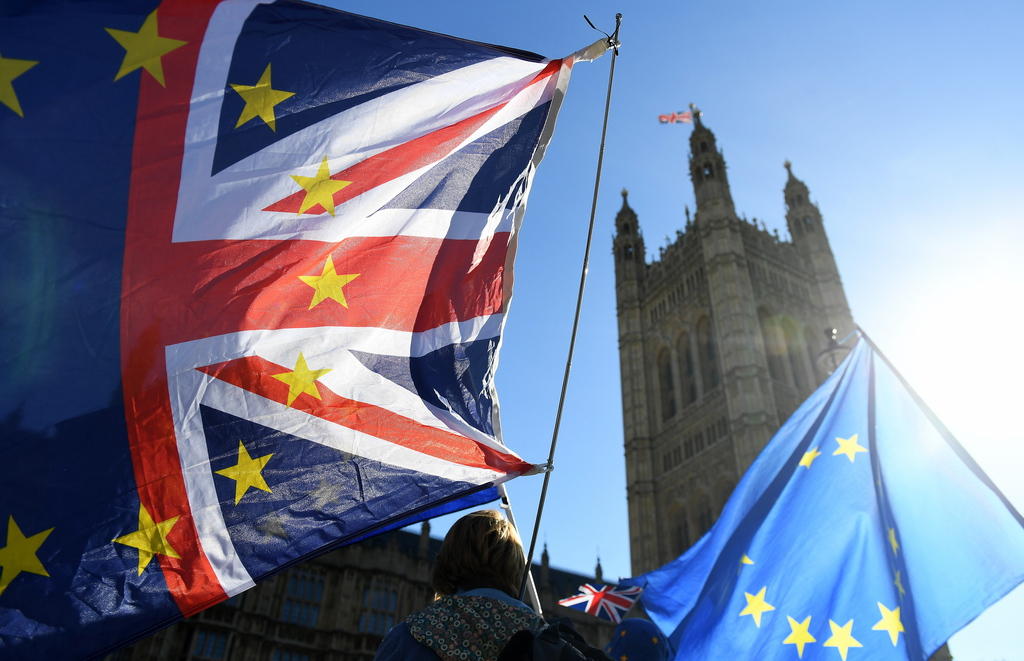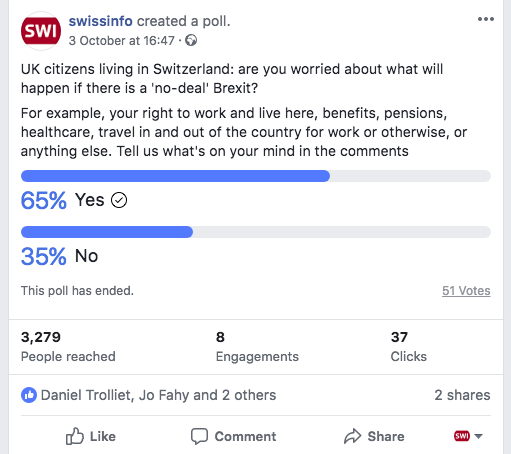
What would a no-deal Brexit mean for Brits in Switzerland?

If the UK drops out of the EU without a deal – what will happen to UK citizens in Switzerland? With six months to go until the UK leaves the European Union, no agreed exit plan, and no basic citizens’ rights agreement between the Swiss and British, UK citizens abroad are facing major uncertainty.
An outline deal between the UK and the European Union was supposed to be agreed upon by the autumn: the clock is ticking, and what might happen in the next week or so is anybody’s guess. The British Prime Minister Theresa May’s much-discussed ‘Chequers’ proposal (so called after the Prime Minister’s country residence where the government agreed on their proposition) was declared unworkable by EU leaders in Salzburg towards the end of September and even British politicians are far from united over whether they back the proposal.
And of course, while an EU deal is still outstanding, so too are bilateral agreements that have to be made between the UK and Switzerland. In August, the British government published specific guidelinesExternal link for what would happen in case of a ‘no-deal’ scenario. Where would medicines and food come from, for example?
UK nationals in Switzerland face their own unique set of questions: should they also start preparing for what may come on the day the UK leaves the EU on March 29, 2019, or when the Brexit ‘transition period’ finishes at the end of December 2020?
Citizens’ rights – or lack thereof
A no-deal Brexit could be seen as a worst-case scenario for these people, bringing major uncertainty and an as-yet undefined legal basis for their residency. Switzerland is not a member of the EU, but EU citizens’ right to reside and work in Switzerland is governed by the same agreement as in EU countries – the free movement of people accord – which the UK would no longer be part of after Brexit. A new bilateral agreement is needed between the two nations.
A House of Commons library briefing from the end of September listed the ‘unknowns’ surrounding Brexit: ‘rights of UK expats’ are here notably described as only ‘partially known’.
Brexit Unknowns – from House of Commons library briefing – https://t.co/AWqfYhjhPHExternal link pic.twitter.com/hmp1k1j36uExternal link
— AndrewSparrow (@AndrewSparrow) October 8, 2018External link
In December 2017, the UK and EU confirmed a ‘Citizens’ Rights AgreementExternal link’ which details the basic residency and healthcare rights of UK nationals living in the EU, while exit negotiations are still ongoing. There is still no such agreement with Switzerland however.
“The citizens’ rights agreement reached in December does not cover UK nationals living in Switzerland.”
The UK government websiteExternal link clearly states, “The citizens’ rights agreement reached in December does not cover UK nationals living in Switzerland. The UK is currently negotiating with Switzerland with the aim of securing a deal on citizens’ rights similar to the one agreed between the UK and EU”.
How far have bilateral talks come?
swissinfo.ch contacted the British embassy in Bern to find out what stage talks are at, to secure UK citizens’ position in Switzerland.
“Providing certainty for citizens has been a top priority for the UK government and the British Embassy in Berne from the start of the EU exit process,” they responded in a written statement. They added that officials on both sides are “working towards an agreement securing the status of our citizens”.
They didn’t comment on what stage these discussions have reached, if only to say that several rounds of “scoping talks” have been held along with “policy specific workshops”.
In an online video statement by Jane Owen, British ambassador to Switzerland and Liechtenstein, she comments that the British have been “very clear” that they want to reach a similar agreement.
Preparing for the ‘partially unknown’
Given this ‘partially unknown’ situation that UK nationals in Switzerland find themselves in, should Brits abroad simply ‘keep calm and carry on’? To get a taste of opinion on the matter, we asked our readers on Facebook and Twitter if the UK citizens in Switzerland among them were concerned about a no-deal scenario.

Over on Twitter, we saw a similar result.
UK citizens living in Switzerland: are you worried about what will happen if there is a 'no-deal' Brexit?
— swissinfo.ch (@swissinfo_en) 3 October 2018External link
Eg. Your right to work and live here, benefits, pensions, healthcare, travel in and out of the country for work or otherwise, or anything else. Tell us what's on your mind!
One reader responded with a ‘partially unknown’ of their own. Despite reassurances from officials that nothing will change for people already living here with a permit, what and how things will change after Brexit is still hard to say.
So had any of our readersExternal link started working on their own personal plan B, to secure their future in Switzerland after Brexit? We asked if anyone had already taken any measures in case of a ‘no-deal’ Brexit.
An Irish passport: ‘my little bit of rebellion’
UK citizen Annie Morgan, who has lived in Switzerland for 15 years, already has her own plan B in place.
“Why did I apply for an Irish passport?” Annie mulled over her decision on the phone to swissinfo.ch while in the car headed to Lugano, southern Switzerland for the weekend. “I did it because I realised if I want to go and live anywhere else in the EU, I’ve got this passport, so I can move around easier. That, and also to secure my right to stay in Switzerland.”
“It was always there, but I hadn’t previously considered it.”
Asked why she hadn’t applied for the Irish passport before, she replied: “It was always there. My father was Irish. But I hadn’t previously considered it. Why spend the money for something we didn’t need before?”
Annie lives in canton Aargau, but doesn’t have a Swiss passport, “it’s quite expensive and my German is appalling” she laughed. She would prefer the UK stayed in the EU, and has had her Irish passport for six months now. She uses it for all trips except going to the UK: “it’s my little bit of rebellion”.
She said she’s not as worried about what will happen after Brexit now that she has an EU passport, but for those who don’t, she fears the British abroad will be used as “bargaining chips”. “They don’t seem to have British abroad high up their priority list. There’s no plan!”.
Getting your Swiss house in order
The campaign group ‘British in Europe’ has published a checklistExternal link of measures they believe Brits living in the EU should be taking in case of a ‘no-deal’ scenario. Given that EU rules on immigration also cover the relationship between the UK and Switzerland under the free movement principle, this advice could also apply to UK nationals in Switzerland.
“Make sure you’re correctly registered as resident in Switzerland”
The group writes “it’s a good idea to make some personal preparations for a no-deal scenario” and lists ten points such as “make sure you’re legally resident in your host country”, “top up your medication before 29 March 2019” and details a dossier that concerned expats could start putting together, in case they have to prove their right to live in their adopted country. The UK government also advises its citizensExternal link to “make sure you’re correctly registered as resident in Switzerland”.
Meanwhile, the British embassy in Bern remains positive that both sides in the UK-Switzerland bilateral talks want to find a mutually beneficial solution. “Our shared guiding principle is to enable UK nationals in Switzerland and Swiss nationals in the UK before exit day to continue living their lives broadly as they do now”. The agreements that currently stand will do so until the end of the implementation period, at the end of 2020.
Theresa May’s post-Brexit vision includes an immigration policy which would no longer give EU citizens preferential treatment, the aim being to reduce low-skilled migration. Under the free movement of people agreement, Switzerland and the UK give each other reciprocal immigration rights: will Switzerland allow UK citizens open access to the Swiss workforce, if the UK doesn’t respond in kind?
You can contact Jo Fahy, the author of this article, on FacebookExternal link or TwitterExternal link.

In compliance with the JTI standards
More: SWI swissinfo.ch certified by the Journalism Trust Initiative































You can find an overview of ongoing debates with our journalists here . Please join us!
If you want to start a conversation about a topic raised in this article or want to report factual errors, email us at english@swissinfo.ch.